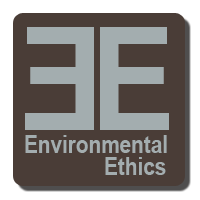Description
The field of environmental ethics emerged during the later-part of the 20th century and initiated a revolution in moral thinking by inquiring into the moral status of the natural world and non-human entities. This innovation in moral philosophy not only challenged the anthropocentric privilege that had persisted in ethics for over 2000 years but opened moral and legal consideration to other forms of "otherness." This seminar engages students in a critical examination of the opportunities and challenges of environmental ethics. The course is primarily organized around the reading of seminal texts in the field in order to provide students with a survey of the relevant literature on this subject, knowledge of the fundamental debates and controversies that shape its configuration, and familiarity with of state-of-the-art innovations in this relatively new field of philosophical inquiry.Instructor
Name: Dr. David J. GunkelPosition: Distinguished Teaching Professor
Institution: Northern Illinois University (USA)
Email: dgunkel@niu.edu
Website: gunkelweb.com
Pre-Requisites
Because the course is taught in English and utilizes original source material written in the English language, it has the pre-requisite of English level B1 or above.Method of Teaching
- Guided reading of seminal texts in the field of environmental ethics. All texts are available online (in pdf format) and are directly accessible through the course calendar. Each week the instructor will post a video introduction to help set-up and organize this effort. Each text will also be accompanied by a set of questions to assist student reflection and learning. Students are asked to record answers to these questions in their notebook or reading journal.
- Online discussion of trends, developments, and controversies. The course will have a Facebook Group to facilitate questions and comments. Students are encouraged to post on the group's page and to employ this resource for interacting with the instructor and each other.
- 16 hours of seminar meetings comprised of instructor led lectures followed by debate. These meeting will take place in January, when the instructor will be in residence in Warsaw.
Course Objectives
Content - Students will acquire critical understanding of:- The influential thinkers and texts in the field of environmental ethics
- The innovative moral theories and research methods that have been developed and deployed by philosophers and activists
- The opportunities and challenges confronting current and future developments in this relatively new field of study
- To read and evaluate different kinds of writings in the field of environmental ethics
- To identify and evaluate environmental-related ethical issues
- To analyze different kinds of philosophical arguments
- To construct and defend philosophical positions and present them persuasively to others
Learning Outcomes
Student evaluation will take place by way of one of two assessment options: 1) a written comprehensive examination or 2) an individual research paper of approximately 15 pages. Students will have the ability to select which assessment option works best for them and their program of study.- Exam - The exam will consist of 4 short answer questions that will ask students to reflect on the course readings and the lectures. Each question will require students to provide both factual data, drawn from our work in the course, and a critical analysis of an issue or problem in the field of environmental ethics. The examination questions will be distributed at the end of the last lecture on 15 January 2016. Students will be asked to complete the exam outside class and email their answers to the instructor by 12:00 (Warsaw time) on 19 January 2016. Late examinations will not be evaluated. In responding to the exam questions, students may use any materials they need to construct a thoughtful and persuasive response (course readings, the Internet, their notes from the lectures, etc.).
- Paper - The term paper should be an argumentative, philosophical essay of approximately 8,000 words, notes and bibliography included. Students may select any topic or subject matter related to the content of the course, and they are encouraged to pursue their own interests and line of inquiry. Papers should be written in English using any of the standard citation methods (MLA, APA, Chicago, etc.). Completed papers should be delivered in both hard copy to the instructor on the final day of lectures in Warsaw (15 January 2016) and in digital form (pdf document) via email. Late papers will not be accepted or evaluated.
